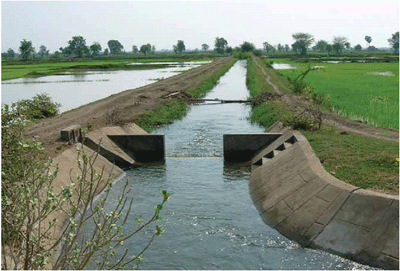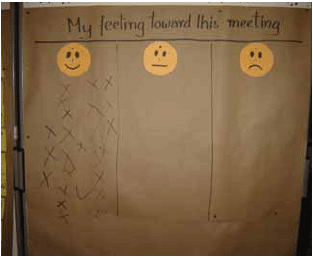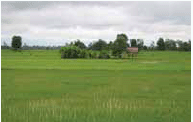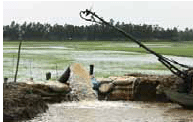Agriculture, Irrigation and Forestry Programme

The second phase of the Agriculture, Irrigation and Forestry Programme continued activities in two components over 2007: Watershed Management and Irrigation and Agriculture. Under these two components there are four current projects:
- Watershed Management – in partnership with GTZ
- Demonstration of Multi-Functionality of Paddy Fields
- Improvement of Irrigation Efficiency on Paddy Fields
- The Challenge Programme on Water and Food.
The overall programme aim is to contribute to the achievement of the MRC mission in areas related to land and water use in agriculture, irrigation and forestry. Each project offers technical resources that can improve the sustainable use of land and water resources for the benefit of communities across the basin, with particular reference to food security and poverty alleviation.
Component 1: Watershed Management
The MRC/GTZ Watershed Management Project
Run in partnership with the German agency for technical cooperation,
GTZ, this project comprises three subcomponents: policy analysis
and advice, information management and capacity building. All
three of these activities made good progress during 2007.
National Working Groups (NWGs) in each Member State help translate the goals of the project into activities and accomplishments on the ground in each country. The chairpersons of these groups, plus high-level representatives of the NMCs, met in January and October to endorse the general outline and concept of the project. This endorsement indicated acceptance in the Mekong region for the ‘new’ concept of watershed management, of the need for an institutional development process for such management, and for a number of policy analysis activities. It was also agreed that an intensive capacity building programme is required along with results-based monitoring.
The Policy Analysis and Review Process on Watershed Management and related issues has entered its final stage. National consultants, working in close cooperation with the NWGs, completed second drafts of the review in all four countries, compiling the findings into a matrix that makes it easy to identify priority fields for policy drafting and coordination. The analysis was used to discuss the development of watershed management initiatives at a Regional Consultation Meeting held in November. To further institutional development, and so increase localownership of watersheds, the project invited stakeholders from provinces, districts and communes in pilot watersheds in Cambodia, the Lao PDR and Viet Nam to discuss and initiate the establishment of Watershed Committees. These institutions will provide a platform for integrating watershed management issues into provincial, district and commune planning.
A draft Watershed Management Resource Kit has been completed as a working document and its main parts translated into the four riparian languages. The kit compiles concepts and experience from all the over the world and will be used to raise awareness and develop capacity regarding watershed management in the four MRC member countries. During 2008 comments will be collected on technical issues and the user friendliness of the document before a final version is produced. The MekongInfo interactive website continues to provide a valuable knowledge resource across the region and will eventually be fully integrated into the MRC information and knowledge portal. The project is also helping to develop databases that will support watershed management in pilot areas.
Training tailored for specific target groups was conducted over 2007 with middle managers, local leaders, and provincial and district planners attending courses in watershed management matters. Watershed Management Learning Centres have been set up in all four countries to boost awareness of the importance of natural resources in general, and water and watersheds in particular. These will run in close cooperation with the Watershed Committees.
Component 2: Irrigation and Agriculture
Demonstration of Multi-Functionality of Paddy Fields
This project, designed to show visible examples of paddy field
functions based on studies at selected sites in the member countries,
came close to completing project activities in 2007. Two research
studies on fields and irrigation, in northeast Thailand and
Viet Nam’s Mekong Delta, came to a close and reports were produced
on several selected functions, including flood mitigation, soil
conservation, and aquatic ecosystems. Parts of the results were
presented at the International Network for Water and Ecosystems
in Paddy Fields Working Group-3 meeting in Bangkok in July.
The project also organised a wrap-up fourth regional workshop
in August and is now compiling all outputs, relevant information,
history of implementation and financial information into a completion
report.
Improvement of Irrigation Efficiency on Paddy Fields
Fieldwork to observe dry season irrigation practices was completed
over 2006-2007 and teams from the Member States are now finalising
interim reports, assisted by suggestions from the Secretariat.
Based on the data collected, the MRCS conducted a primary analysis
and produced a brief technical paper that was presented at the
Third South East Asia Water Forum. The project also compiled
a Rapid Appraisal Process initial assessment report and a training
workshop. Japan’s National Institute for Rural Engineering is
providing assistance with final products (i.e. guidance documents
for efficient irrigation water use).

The 2007 Regional Consultation Meeting
on Sustainable
Watershed Management proved a hit with participants
from the four Member States.
Challenge Programme on Water and Food (CPWF)
The CPWF is affiliated to the International Water Management
Institute in Sri Lanka. As the coordinating institution of the
CPWF in the Mekong, the MRC hosts the programme at the Secretariat
in Vientiane and provides managerial assistance.
In 2007 the programme’s Basin Coordinator at the MRC provided considerable input into the editing of a volume entitled Bright Spots: Reversing Trends in Land and Water Degradation. In the Mekong Focal Project considerable progress has been made in securing data from the MRC member countries to develop tools and maps depicting water usage in the basin, including ‘water poverty’. Discussion on the CPWF’s focus, basins, impact, and governance in 2007 suggested that the programme has potential and should continue, but with changes. A proposed Phase 2 is likely to be approved in early 2008.
Choose a newsletter:

